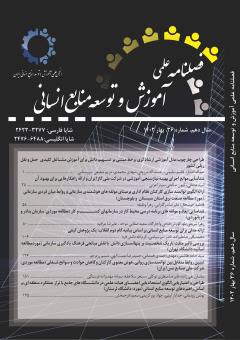شناسایی ابعاد و مولفه های برنامه درسی محیط کار در سازمان¬های کسب و کار (مطالعه موردی: سازمان بنادر و دريانوردي)
محورهای موضوعی :
زهرا شریفی بلو
1
,
کورش فتحی واجارگاه
2
,
سعید صفایی موحد
3
![]() ,
علیرضا عراقیه
4
,
علیرضا عراقیه
4
1 - دانشجوی دکتری،گروه علوم تربیتی، واحد تهران مرکزی، دانشگاه آزاد اسلامی، تهران، ایران..
2 - استاد، گروه علوم تربیتی، دانشکده علوم تربیتی و روانشناسی دانشگاه شهید بهشتی، تهران، ایران
3 - استادیار، گروه علوم تربیتی، واحد تهران مرکزی، دانشگاه آزاد اسلامی، تهران، ایران
4 - استاد، گروه علوم تربیتی، واحد اسلامشهر، دانشگاه آزاد اسلامی، تهران، ایران
کلید واژه: برنامه درسی, محیط کار, مدیریت یادگیری, سازمان بنادر و دریانوردی.,
چکیده مقاله :
پژوهش حاضر با هدف شناسایی ابعاد و مولفه¬های برنامه درسی محیط کار در سازمان¬های کسب و کار در سازمان بنادرو دریانوردی انجام پذیرفت. این پژوهش از لحاظ هدف، کاربردی و رویکرد پژوهش حاضر، کیفی و از نوع پژوهش نظریه¬ای بود. شرکت کنندگان پژوهش، شامل خبرگان و متخصصان رشتۀ برنامۀ درسی که همگی دارای مدرک دکتری برنامۀ ریزی درسی هستند و همچنین کارکنان سازمان بنادر و دریانوردی در سطوح مدیریتی، کارشناسی که حداقل 5 سال تجربه کار در آموزش و توسعه منابع انسانی سازمان بنادر و دریانوردی را دارا بود. برای تعیین نمونه¬ها از روش نمونه¬گیری غیر تصادفی هدفمند استفاده شد که 20 نفر با استفاده از اصل اشباع به عنوان حجم نمونه، در نظر گرفته شد. در این پژوهش بهمنظور گردآوری دادهها، از روشهای کتابخانهای(شامل کتابها، پایگاههای معتبر علمی و پایاننامههای دانشگاهی) و مصاحبۀ نیمه ساختاریافته استفاده شد. به منظور تعیین روایی ابزار، از معیارهای کیفیت پژوهش کیفی استفاده شد. این معیارها شامل، دقت، اعتبار، قابلیت اعتماد، انتقال پذیری و تایید پذیری بود که مورد تایید قرار گرفتند. روش تحليل داده¬ها در پژوهش حاضر، تحلیل مضمون بود. نتایج حاصل از تحلیل نشان می¬دهد که از میان 121 شاخص (گویه) موجود، 24 مولفهی اصلی قابل شناسایی است. بر اساس نتایج حاصل از پژوهش، می توان دریافت که ساختار برنامه درسی شامل مولفه¬های هدف( نیازسنجی، سازگاری فرهنگی و تفاوت¬های فردی و انعطاف پذیری)، محتوا ( چالش برانگیزی، متناسب و سهولت در دسترس) و ارزشیابی ( تناسب سنجش و ارزشیابی با اهداف، محتوا و منابع یادگیری، وضوح و شفافیت معیارهای سنجش، استفاده از روشهای سنجش و ارزشیابی و سنجش انعطاف پذیر) می باشد. در مورد عوامل موثر بر بر طراحی وتدوین برنامه درسی محیط کار مبتنی برمدیریت یادگیری در سازمان بنادر و دریانوردی، نتایج حاصل از پژوهش نشان داد که عوامل مدیریتی، عوامل سازمانی، عوامل فردی، عوامل آموزشی از عوامل موثر می¬باشند. همچنین پارادایم مدیریت یادگیری در مقایسه با مدیریت اموزشی شامل مولفه های یادگیری موثر، دانش¬مداری، نگرش، عوامل سازمانی، می باشند. اصول و مفروضات الگوی برنامه درسی محیط کار مبتنی بر مدیریت یادگیری شامل مولفه های محورهای برنامه درسی، عوامل توسعه¬ای، ارزش و ویژگیهای برنامه درسی مبتنی بر مدیریت یادگیری شامل مولفه¬های ویژگی ماهیتی، ویژگی یادگیری و ویژگی محیطی شناسایی شدند.
This study investigated the dimensions and components of the curriculum of the work environment in business organizations in the Ports and Maritime Organization. In terms of purpose, this research was applied and the method was qualitative and theoretical. The participants of the research include experts and specialists in the field of curriculum, with a doctorate in curriculum planning, as well as employees of the Ports and Maritime Organization at the managerial level ad also the experts who have at least 5 years of work experience in the training and development of human resources of the Ports and Maritime Organization. To determine the samples, a non-random sampling method was used, and 20 individuals were considered as the sample using the principle of saturation. In this research, in order to collect data, library methods (including books, authoritative scientific databases and university theses) and semi-structured interviews were used. In order to determine the validity of the tool, qualitative research quality criteria were used. These criteria included accuracy, validity, reliability, transferability and confirmability, which were approved. The method of data analysis in the present study was thematic analysis. The results of the analysis showed that among the 121 indicators (items) available, 24 main components can be identified. Based on the results of the research, it could be seen that the structure of the curriculum includes target components (needs assessment, cultural adaptation and individual differences and flexibility), content (challenging, appropriateness and ease of access) and evaluation (suitability of measurement and evaluation with objectives, content and learning resources, clarity and transparency of assessment criteria, use of assessment and evaluation methods and flexible assessment). Regarding the effective factors on the design and compilation of the learning management-based work environment curriculum in the port and maritime organization, the results of the research indicated that managerial factors, organizational factors, individual factors, and educational factors are effective factors. Also, compared to educational management, the learning management paradigm includes effective learning components, knowledge orientation, attitude, and organizational factors. The principles and assumptions of the curriculum model of the workplace based on learning management, including the components of curriculum axes, development factors, value and characteristics of the curriculum based on learning management, including the components of nature characteristics, learning characteristics and environmental characteristics, were identified.
